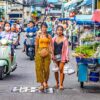Bangkok, Thailand’s vibrant capital, stands as a mesmerizing metropolis where ancient traditions seamlessly blend with ultramodern urban landscapes. This sprawling city of over 10 million residents offers travelers an extraordinary journey through cultural complexity, sensory experiences, and dynamic energy that captivates visitors from around the globe. From ornate Buddhist temples to bustling street markets, gleaming skyscrapers to traditional floating markets, Bangkok represents a microcosm of Thailand’s rich heritage and rapid contemporary transformation.
Historical Background and Cultural Significance
Founded in 1782 as the capital of Siam, Bangkok has evolved from a small trading settlement to a global megalopolis. The city’s historical roots are deeply embedded in the Chakri Dynasty, which continues to play a significant role in Thai society. Bangkok’s strategic location along the Chao Phraya River facilitated its growth as a crucial commercial and cultural hub, attracting merchants, diplomats, and travelers throughout centuries of transformation. The city’s architectural landscape reflects multiple historical periods, with magnificent royal palaces, intricate Buddhist temples, and colonial-era buildings standing alongside contemporary architectural marvels.
Understanding Bangkok’s cultural complexity requires recognizing its multilayered identity. The city seamlessly integrates traditional Buddhist practices with modern cosmopolitan lifestyles, creating a unique urban environment where ancient rituals coexist with cutting-edge technology and global influences. This dynamic interplay between tradition and innovation makes Bangkok one of the most fascinating urban destinations in Southeast Asia.
Architectural and Religious Landmarks
Bangkok’s architectural landscape is dominated by breathtaking religious and royal structures that showcase extraordinary craftsmanship and spiritual significance. The Grand Palace, a sprawling complex covering 54 acres, represents the pinnacle of Thai architectural achievement. Constructed in 1782, this magnificent site served as the official residence of Thai monarchs and remains a testament to the country’s royal heritage. Nearby, Wat Phra Kaew (Temple of the Emerald Buddha) stands as Thailand’s most sacred Buddhist temple, housing a revered emerald Buddha statue carved from a single jade block.
Other remarkable religious landmarks include Wat Arun, known as the Temple of Dawn, featuring intricate porcelain-decorated spires that create a stunning riverside silhouette. These architectural marvels not only represent spiritual sanctuaries but also serve as living museums documenting Thailand’s rich cultural narrative. Visitors can explore these sites to gain profound insights into Buddhist philosophy, royal traditions, and artistic expressions that have shaped Thai society for generations.
Culinary Experiences and Street Food Culture
Bangkok’s culinary landscape is renowned worldwide for its extraordinary street food scene, offering an unparalleled gastronomic adventure. The city’s street markets and food stalls provide an authentic glimpse into local cuisine, with dishes that balance complex flavor profiles combining sweet, sour, salty, and spicy elements. Popular street food items like pad thai, som tam (green papaya salad), and mango sticky rice represent just a fraction of the culinary diversity available in Bangkok’s bustling food markets.
Areas like Chinatown (Yaowarat) and Sukhumvit offer immersive food experiences where travelers can sample hundreds of traditional and contemporary dishes. The city’s street food culture goes beyond mere sustenance, representing a social experience that connects people across different socioeconomic backgrounds. Michelin-starred street food vendors like Jay Fai have elevated Bangkok’s culinary reputation, demonstrating that exceptional gastronomy isn’t confined to high-end restaurants.
Modern Urban Landscape and Infrastructure
Contemporary Bangkok represents a sophisticated urban environment with world-class infrastructure, advanced public transportation systems, and a thriving economic ecosystem. The city’s BTS Skytrain and MRT subway networks provide efficient transportation, connecting various districts and reducing traffic congestion. Cutting-edge shopping centers like Siam Paragon and CentralWorld showcase Bangkok’s status as a premier retail destination, offering luxury brands, entertainment venues, and multicultural dining experiences.
The city’s economic dynamism attracts global businesses, multinational corporations, and entrepreneurs, positioning Bangkok as a significant regional economic hub. Its strategic location, skilled workforce, and progressive business environment have transformed the metropolis into a center for innovation, technology, and international commerce. The ongoing urban development projects continually reshape Bangkok’s skyline, reflecting its ambitious vision for future growth and modernization.
Tourism and Traveler Experiences
Bangkok offers diverse experiences catering to various traveler preferences, from budget backpackers to luxury tourists. The city’s comprehensive tourism infrastructure ensures comfortable and engaging visits, with accommodations ranging from affordable hostels to five-star international hotels. Popular districts like Khao San Road attract young international travelers, while areas such as Sukhumvit and Silom provide more sophisticated entertainment and dining options.
Beyond urban attractions, Bangkok serves as a gateway to exploring Thailand’s diverse landscapes, including tropical islands, mountain regions, and historic sites. The city’s international airport connects travelers to numerous regional destinations, making it an ideal starting point for comprehensive Southeast Asian adventures. Visitors can enjoy traditional Thai massage, explore floating markets, participate in cooking classes, and engage with local communities, creating memorable and transformative travel experiences.
Bangkok represents a captivating destination that defies simple categorization, offering travelers an immersive journey through cultural complexity, historical depth, and contemporary dynamism. Its ability to preserve traditional practices while embracing global influences makes it a truly unique urban environment. Whether you’re interested in spiritual exploration, culinary adventures, architectural wonders, or urban experiences, Bangkok promises an unforgettable destination that will challenge, inspire, and transform your understanding of Southeast Asian culture.









